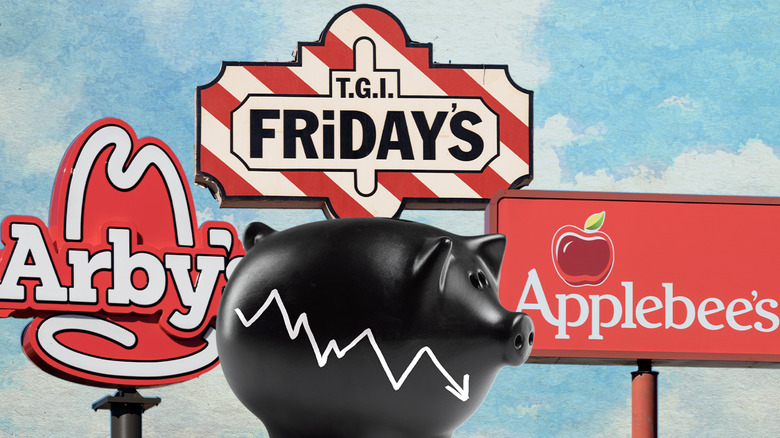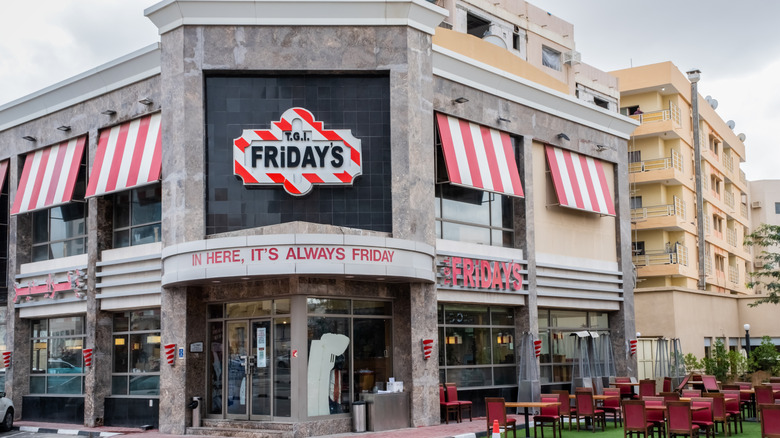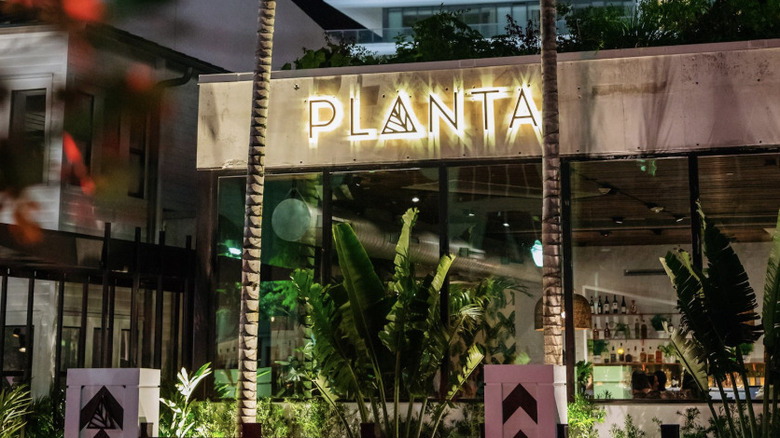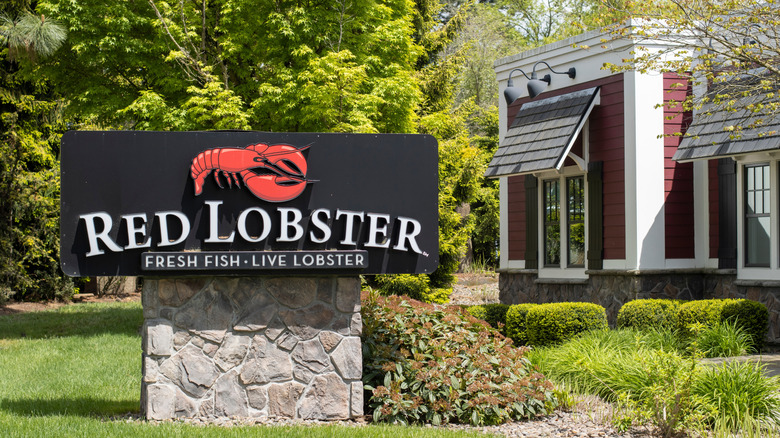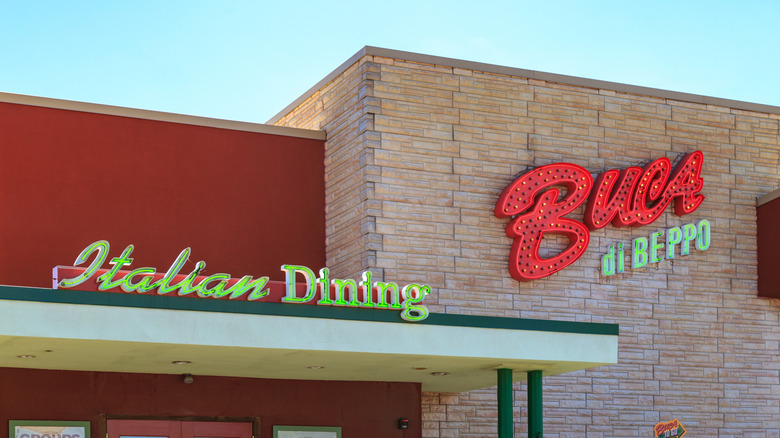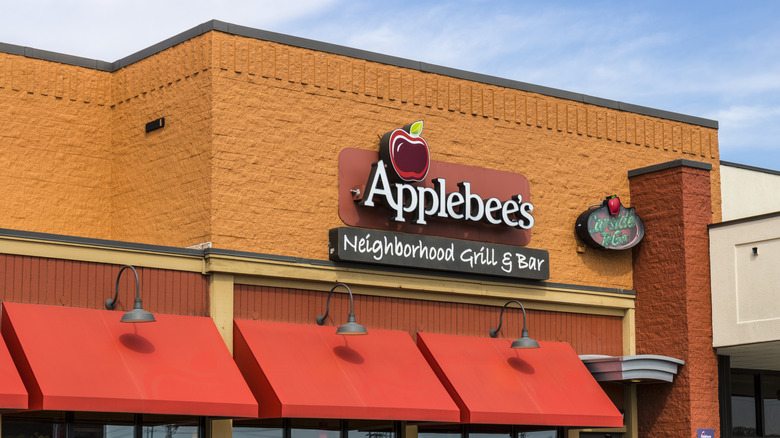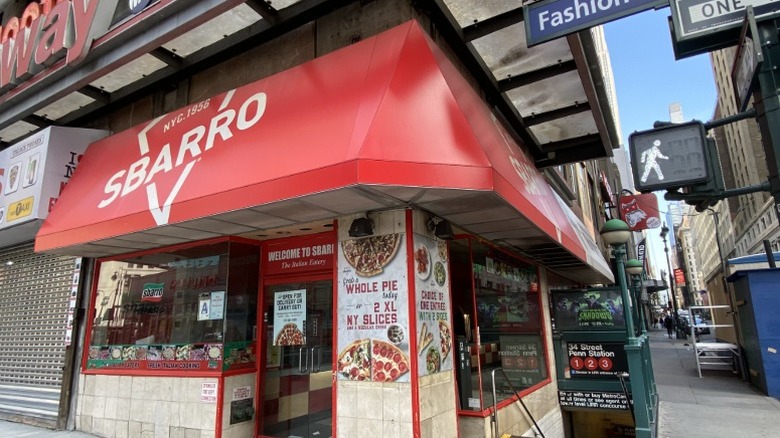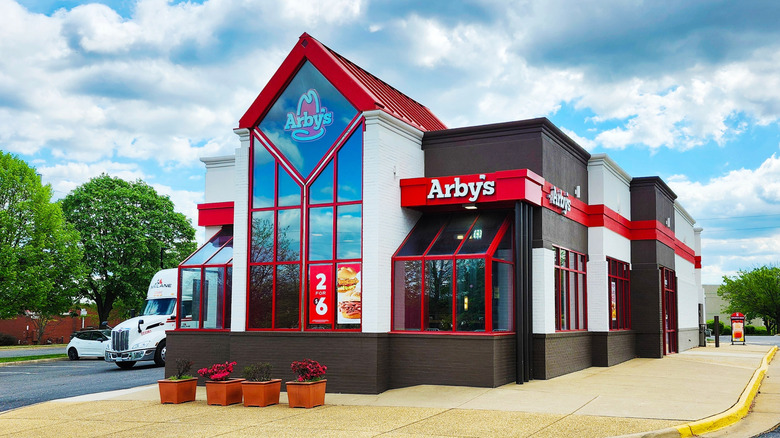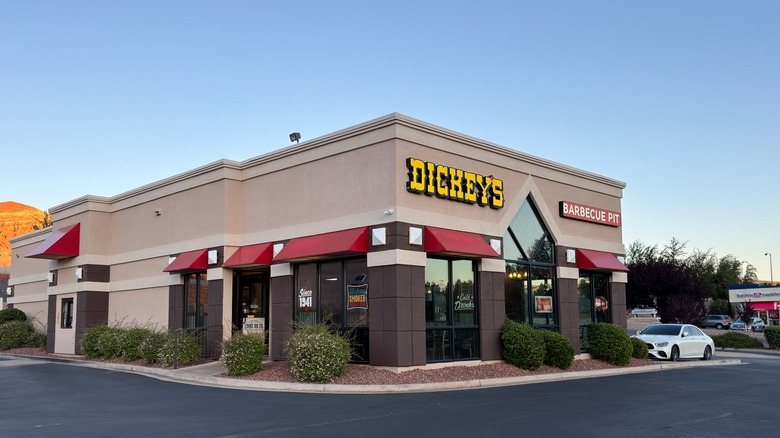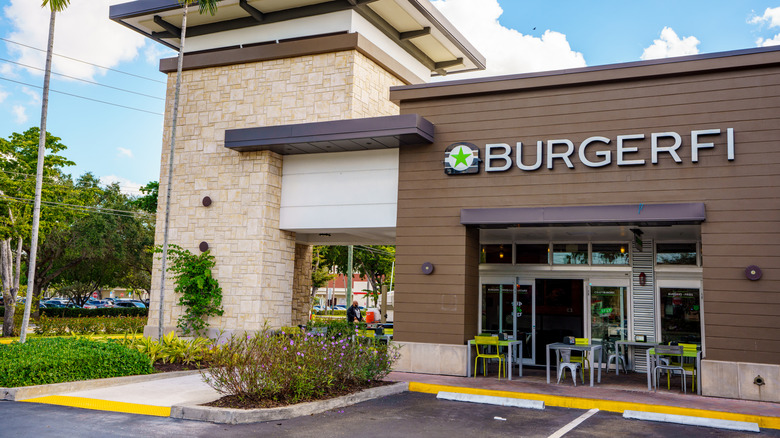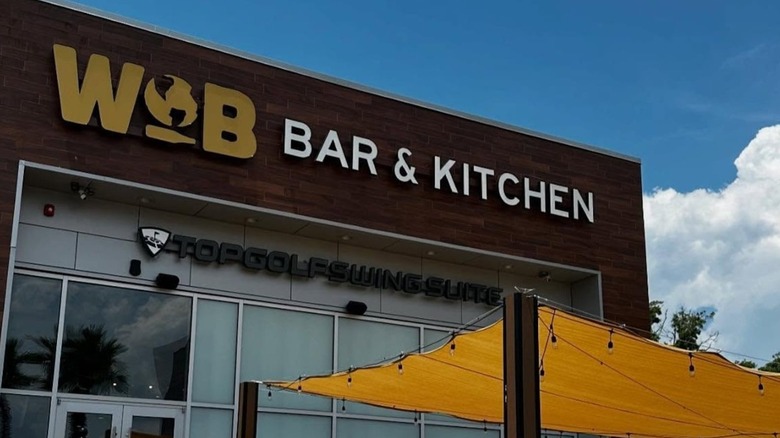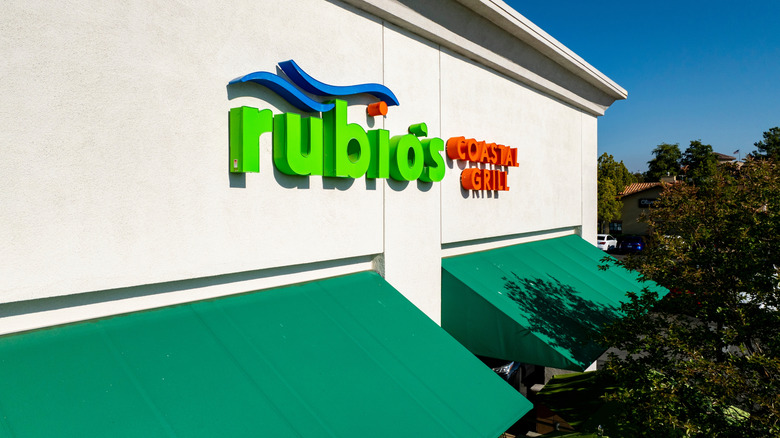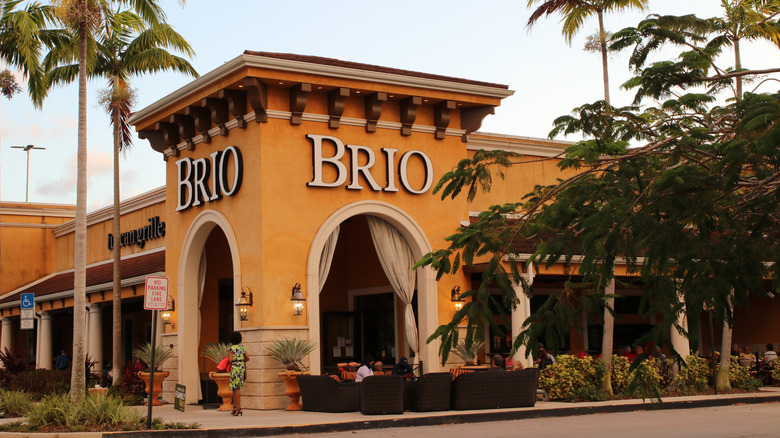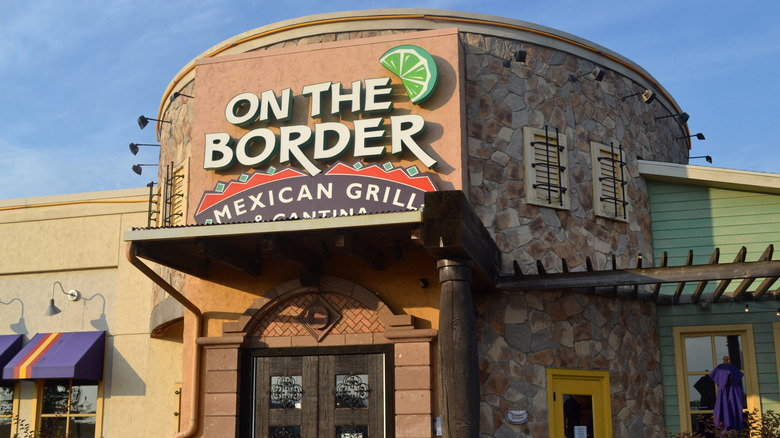The 13 Most Unexpected Restaurant Chains That Filed For Bankruptcy
It's difficult to imagine that chains with dozens, hundreds, and even thousands of restaurants can actually go bankrupt. The sheer scale of these enterprises makes them seem virtually untouchable. However, things can be very different behind the scenes. Growing overheads and rapidly changing consumer preferences can all contribute to rising costs and shrinking profit margins. In addition, the COVID-19 pandemic shifted consumer behavior toward delivery and takeout, negatively affecting most traditional sit-down restaurants.
For struggling chains, filing for Chapter 11 bankruptcy protection is an option that buys time to restructure operations. It gives companies and franchisees breathing room while they renegotiate the terms of their leases and debts. This also means that brands can shutter underperforming locations while continuing to operate more profitable ones.
From household names to mall staples, many popular restaurants have stumbled over the years. Here is an in-depth look at the most unexpected chains to go bankrupt.
TGI Fridays
There is little doubt that TGI Fridays made waves when it first opened its doors on the corner of 1st Avenue and 63rd Street in New York in 1965, even requiring barricades to keep revelers at bay. It wasn't long before the venue became known as a hip hangout for singles, including flight attendants who lived in the neighborhood, whom the restaurant's founder, Alan Stillman, was dying to meet. The venture expanded quickly, offering chicken wings, barbecue ribs, and sizzling fajitas at 601 locations by 2008. This success, however, waned over the following decades, with TGI Fridays losing traction to competitors.
When TGI Fridays filed for bankruptcy in 2024, the chain was down to 163 locations in the U.S. This number stood at 269 the previous year, before a sweeping wave of closures drastically reduced the restaurant's footprint. In addition, the pandemic hit full-service, sit-down chains, such as TGI Fridays, particularly hard, with many diners opting for takeout, delivery, and quick-service alternatives. While the chain attempted to experiment with ghost kitchens and delivery models, the strategy didn't make up for the decline in foot traffic. Today, TGI Fridays has fewer than 100 restaurants in the U.S., highlighting just how far the once-popular casual dining chain has fallen.
Planta
Planta specializes in vegan cuisine and was founded to raise awareness and acceptance of plant-based dining. Just some of the menu items on offer at the vegan restaurant include Spicy Tuna Rolls with ahi watermelon, Beef & Broccoli with seared shiitake "steak," and Udon Noodles with truffle mushroom cream.
The chain, which opened its doors in 2016, prides itself on investing in the environment and the community by sourcing ingredients from regional producers and donating to volunteer programs. Unfortunately, this commitment to sustainability and local investment wasn't enough to keep the chain successful. Planta's bankruptcy in 2025 highlighted that lofty ethos doesn't always translate to profitability.
At the time Planta filed for bankruptcy protection, it was operating 18 locations in the U.S. and Canada. The company reported assets between $50,000 and $100,000 and liabilities between $10 million and $50 million. A lot of this debt stemmed from high rent, rising food prices, and the lingering financial strain of the pandemic. Rather than closing completely, Planta has streamlined its operations, albeit with a much smaller footprint. Today, the chain is down to just nine restaurants in New York, Chicago, Los Angeles, Washington D.C., and Toronto.
Red Lobster
Boasting more than 700 restaurants globally in its heyday, Red Lobster has long been a big name on the casual dining scene. This is why many diners were stunned when the chain filed for Chapter 11 bankruptcy in 2024. While it may have seemed like this collapse came out of the blue, the warning signs had been there for some time.
Red Lobster was founded in 1968 by Bill Darden, who had a vision of making seafood affordable to the average American family –– even those living far from the country's coastlines. The burgeoning chain was a resounding success, eventually gaining backing from General Mills. This gave the restaurant the necessary resources and infrastructure for expansion.
Interestingly, many blamed Red Lobster's decline on its endless shrimp promo, which let diners have their fill of the succulent morsels for a set price. Initially a limited-time offer, the deal was added to the chain's permanent menu in 2023, ultimately resulting in $11 million in losses. While the endless shrimp promo cost the company dearly, it was only one of the many reasons for Red Lobster's downfall. Increasing competition, rising inflation, and high rent costs also contributed to the chain's financial struggles, with the company reporting a net loss of $76 million in 2023. Despite closing many underperforming locations, Red Lobster remains operational and continues serving favorites like grilled shrimp, Atlantic salmon, and Maine lobster.
Buca di Beppo
Buca di Beppo is a casual dining chain that serves traditional Italian American fare like fettuccine alfredo, pizzas, and chicken parmigiana. The chain got its start in 1993 as a neighborhood trattoria in a Minneapolis basement. From its humble beginning, the restaurant gradually grew into a nationwide chain known for its kitschy decor and shareable portions.
In its heyday, Buca di Beppo boasted nearly 100 locations nationwide. Things seemed to be going well for the red sauce venture until changing dining habits, rising costs, staffing difficulties, and competition from other chains reduced its customer base. Its reputation as an overpriced Italian restaurant chain didn't help. The COVID-19 pandemic only exacerbated these challenges, accelerating the financial strain on the restaurant. Unable to absorb the rising costs amid reduced traffic, Buca di Beppo filed for bankruptcy in 2024. After the bankruptcy-related closures, the chain's footprint has shrunk to roughly 40 locations, more than a third of which are in California.
Applebee's
With nearly 1,500 locations in the U.S., Applebee's is one of the most recognizable casual dining brands in the country. Given this wide footprint, many found it surprising that the chain was one of many restaurants that had to close several locations in 2024. In reality, it was Applebee's franchisees — including Apple Central and Louisiana Apple — and not Dine Brands Global, the parent company, that filed for bankruptcy protection under Chapter 11. Louisiana Apple filed for bankruptcy after falling behind on loan payments and facing lawsuits from both its bank and the parent company over unpaid debts. Meanwhile, Apple Central claimed that it never recovered from the slump of the COVID-19 pandemic, leaving it unable to continue operating all of its restaurants. This later led Applebee's to sue Apple Central for unauthorized restaurant closures.
This isn't the first time that an Applebee's franchisee declared bankruptcy. In 2018, RMH Franchise Holdings, the chain's second-largest franchisee at the time, also filed for bankruptcy. At the time of the filing, the franchise owner operated 146 Applebee's locations across several states. Earlier the same year, Dine Brands had taken legal action against RMH, alleging that the franchisee forfeited its rights by failing to pay royalties. The court ultimately sided with RMH, allowing it to keep operating its restaurants while restructuring.
Sbarro
Sbarro is a Brooklyn–based chain founded in 1956 by Gennaro and Carmela Sbarro. It was originally an Italian salami shop where the duo also served pizza slices to employees. The company grew rapidly, eventually becoming a staple at mall food courts across the globe. The chain's menu expanded to include pastas, salads, and stromboli.
Sbarro hit turbulence with the decline in mall traffic, a trend that revealed just how vulnerable the chain was to changing consumer habits. Amid mounting losses, the company filed for bankruptcy twice in four years — first in 2011 and then again in 2014. Around the time of the second bankruptcy, Sbarro closed more than 180 underperforming restaurants.
Despite the setbacks, Sbarro has managed to weather the storm, opening its 800th restaurant in 2025. A large part of this turnaround has been thanks to Sbarro's strategy of expanding beyond shopping malls into airports, convenience stores, and international markets.
Arby's
Arby's name has an interesting origin. While many believe that the "RB" in the chain's name stands for its signature product, roast beef, it actually refers to the Raffel Brothers, who founded the restaurant in 1964. Inspired by the success of chains such as McDonald's and Burger King, the duo saw a potential market for fast food built around roast beef rather than hamburgers.
Less than a decade later, Arby's had over 300 nationwide locations. However, this rapid expansion eventually backfired. The growth required large amounts of cash, and the brothers relied heavily on loans and outside investors. Hoping to solve the chain's financial problems, the duo planned to take Arby's public in 1970. However, regulatory delays and poor market conditions put an end to the IPO. Without the much-needed funding, the company quickly fell behind on bills and loan payments, declaring bankruptcy at the end of 1970.
Where other chains may have failed, the Raffel brothers managed to turn Arby's around. By 1975, the chain boasted around 500 restaurants. A year later, the duo sold the company to RC Cola for $18 million, pulling off a lucrative exit. Today, Arby's is owned by Inspire Brands and features an impressive footprint of more than 3,500 locations.
Dickey's Barbecue Pit
Opened by Travis Dickey and his wife in 1941, Dickey's Barbecue Pit started small. The duo even rented out advertising space on the restaurant's sign to help pay for expenses. Much like its simple menu of beef brisket, pit hams, and barbecue beans, the chain slowly expanded its number of locations. In 1994, the Dickey's family decided to franchise its restaurant concept.
Today, there are more than 370 Dickey's Barbecue Pit restaurants across the U.S., many of them operated by franchisees. Several of these franchise operators filed for bankruptcy protection over the years. In 2024, Smokin' Dutchman Holdings, which operated four restaurants in Michigan, filed for Chapter 11 bankruptcy protection, claiming that Dickey's financial requirements were overwhelming.
In a similar vein, many Dickey's franchisees have complained that the actual costs of opening and running a store are much higher than promised by the parent company. Amid restaurant closures in 2023 and 2024, franchisees reported being locked into costly supplier contracts that drained their margins. By 2025, numerous franchisees had filed lawsuits against Dickey's, alleging misrepresentation, with at least one franchisee seeking damages of over $1 million.
BurgerFi
Founded in 2011, fast casual chain BurgerFi prides itself on using only high-quality ingredients. The restaurant expanded quickly after its founding, going public in 2020 and later partnering with Reef Technology and Epic Kitchens to open several ghost kitchen locations.
Although BurgerFi offers a cleaner approach to fast food and some of the best chain restaurant burgers, these factors weren't enough to protect it from rising costs and declining sales, resulting in the company filing for Chapter 11 bankruptcy protection in 2024. More specifically, the chain pointed to inflation and rising food and labor costs as the key factors behind filing.
At the time, the chain had 93 BurgerFi restaurants, with 76 run by franchisees and 17 owned by the company itself. The bankruptcy also covered Anthony's Coal Fired Pizza, which BurgerFi had acquired in 2021. The filing only included the corporate-owned locations of both chains. When BurgerFi declared bankruptcy, the chain had assets totaling between $50 million and $75 million and debts of between $100 million and $500 million.
World of Beer
World of Beer is a bar-style chain that specializes in craft beer, with many locations offering hundreds of beers from around the globe and around 50 brews on tap. Guests can combine their drinks with casual pub fare, such as chicken wings and burgers. Founded in 2007 in Tampa, Florida, as a craft beer bottle shop, World of Beer grew to more than 70 locations in 20 states by 2015.
As the business evolved, its early success gave way to a slew of challenges, culminating in the company closing 14 outlets throughout 2024 and filing for bankruptcy in August of the same year. This move was caused by several factors, including interest rate hikes, mounting debts to landlords and banks, and lawsuits from franchisees. In addition, although its low-investment model initially spurred franchising, many operators lacked hospitality experience.
Having restructured its debt, World of Beer emerged from bankruptcy in December 2024 and opened a new location in Fort Worth, Texas, the same year. The company also announced an ambitious plan to continue opening several locations annually during the next five years. As of 2025, World of Beer has about 25 locations in the U.S.
Rubio's Coastal Grill
The idea for Rubio's Coastal Grill was born after its founder, Ralph Rubio, visited San Felipe, Baja California, during spring break and became inspired by the region's fish tacos. Founded in 1983 as a San Diego taco stand, the Tex-Mex restaurant chain has since served hundreds of millions of fish tacos. In its heyday, Rubio's boasted roughly 200 restaurants in the U.S.
Rubio's declared bankruptcy in both 2020 and 2024. The first filing came as a result of reduced traffic during the COVID-19 pandemic. At the time, the company closed 26 struggling locations, ending operations in Colorado and Florida. Despite its best efforts to streamline operations, Rubio's ultimately ended up seeking Chapter 11 protection again in 2024 after three years of losses. The company announced the move shortly after closing 48 underperforming restaurants in California.
In August 2024, TREW Capital Management reportedly purchased Rubio's from the chain's parent company, MRRC Holdings, for $40 million. Rubio's continues to operate today, but with fewer than 100 locations in Arizona, California, and Nevada.
Bravo! Italian Kitchen and Brio Italian Grille
The Bravo! Italian Kitchen and Brio Italian Grille restaurant chains have changed ownership on several occasions. Founded by Bravo Development, the company later adopted the name Bravo Brio Restaurant Group and went public in 2010. It was then acquired by Spice Private Equity and later by FoodFirst Global Restaurants. Just two years after the acquisition, in 2020, FoodFirst filed for bankruptcy protection, blaming challenges related to COVID-19, economic pressures, and underperforming restaurants.
Following the filing, FoodFirst Global Restaurants divested both Bravo Italian Kitchen and Brio Italian Grille to Earl Enterprises. Unfortunately, this change in ownership failed to stabilize the brand, with the operator of the restaurants, Bravo Brio, filing for bankruptcy in 2025.
At the time of the filing, the company was operating 25 Bravo! Italian Kitchen restaurants and 31 Brio Italian Grille locations — a considerable reduction from the 46 of the former and 37 of the latter at the time of the IPO in 2010. The reasons leading to bankruptcy protection and restructuring the company included rising expenses, mounting competition from fast casual restaurants, and declining consumer spending, particularly in shopping center food courts.
On the Border Mexican Grill & Cantina
On the Border Mexican Grill & Cantina is a casual dining chain that specializes in Tex-Mex cuisine like enchiladas, tacos, fajitas, and freshly made guacamole. Opened in 1982 in Dallas, Texas, at its peak, the restaurant boasted a portfolio of more than 150 restaurants in the U.S. and internationally. Unfortunately, the chain was forced to reduce its footprint due to economic pressures, ultimately filing for bankruptcy in 2025. Today, On the Border has dwindled to less than 60 locations in the U.S., and many consider it to be among the worst Mexican restaurant chains.
When On the Border filed for bankruptcy, the chain had debts totaling $25 million and more than 10,000 creditors. The bankruptcy was attributed to changing customer preferences, underperforming locations, labor shortages, and raising inflation. At the time of the filing, On the Border was owned by Atlanta-based Argonne Capital Group, which had acquired the chain from Golden Gate Capital in 2014. It looks like the brand is about to change hands again with Pappas Restaurants selected as the top bidder during the auction for On The Border in May 2025.
